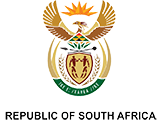Reply by President Cyril Ramaphosa to the debate on the State of the Nation Address
PARLIAMENT, CAPE TOWN 26 JUNE 2019
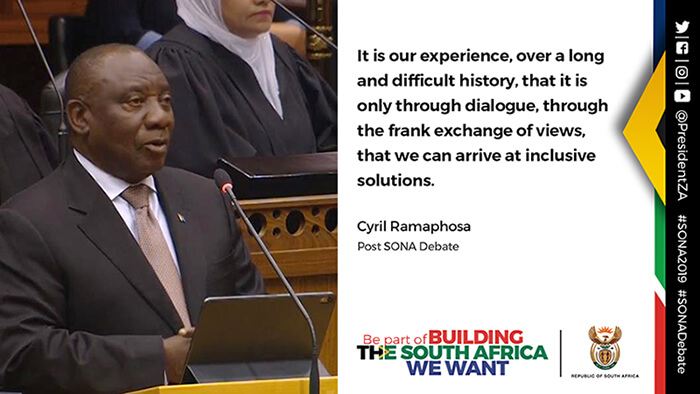
We share common challenges, we share a common future, and we need to forge a common path towards its realisation.
Creating the vision
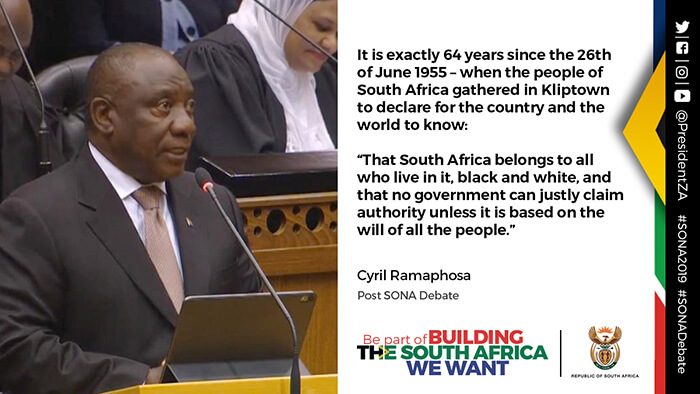
The Freedom Charter was a statement of extraordinary ambition, made at a time when the majority of South Africans lived in conditions of repression, where their rights were denied and their opportunities for economic advancement deliberately curtailed.
They were articulating a dream that many people thought would never be realised.
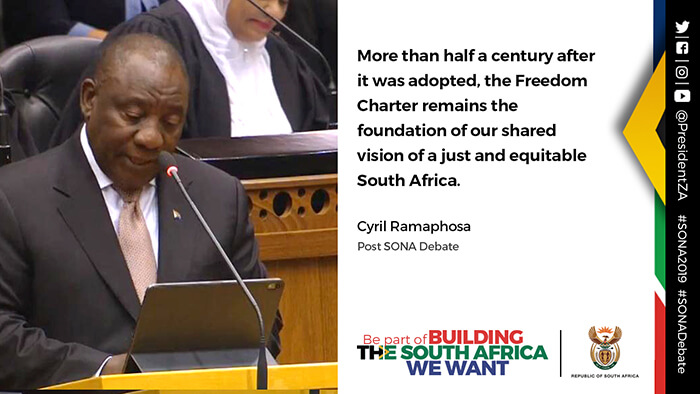
The State of the Nation Address was not merely about dreams.
It was about the lived reality of our people and setting out what we need to do to achieve the South Africa we want.
Seven Priorities
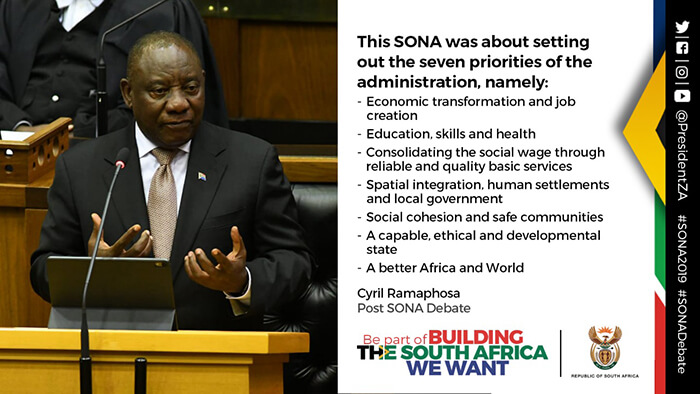
Economy
Our most pressing task is to restart the economy and create jobs.
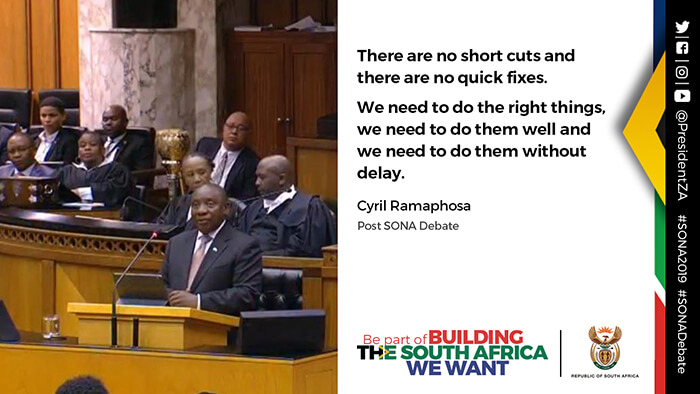
Investment
This year, we are intensifying our investment drive because we have seen that it is producing results.
We are going to hold our second South Africa Investment Conference in November because we have seen commitments made at last year’s conference being implemented.
These are the investments that will, in the months and years to come, be creating new jobs, developing new supply chains and reviving local economies.
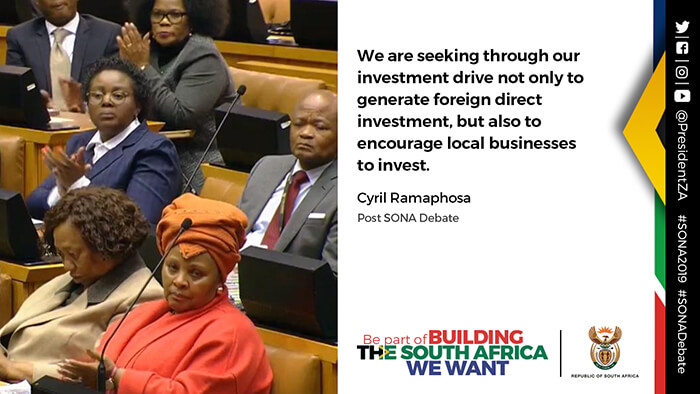
Alongside our investment drive, much detailed work is being directed towards reducing the cost and improving the ease of doing business.
This is a difficult task because it requires significant coordination and integration among a wide range of government departments, spheres and entities.
But we are making steady progress and businesses are starting to feel the impact.
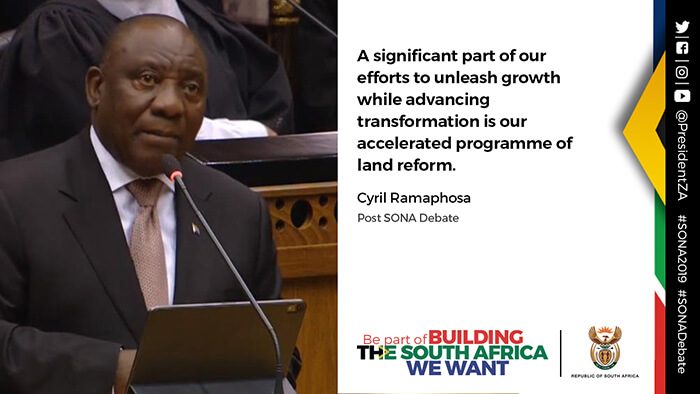
Industrial strategy
A critical part of the work we must do to restart the economy and create jobs is a reinvigorated industrial strategy that effectively harnesses the capabilities of government, state owned companies, business and labour.
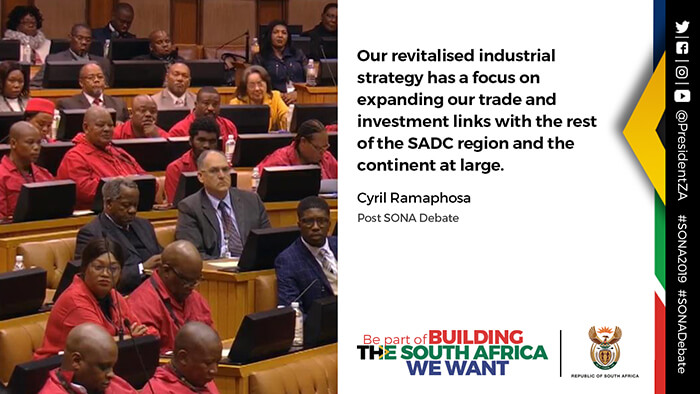
Integrating with the rest of Africa
Expanding trade and investment ties with the rest of Africa underpins our industrial strategy and it is being pursued with vigour.
We must work towards a time when South African-made goods can be found on the shelves of every store on our Continent.
We must look forward to a time when the goods that we import do not come across the ocean, but from across the Limpopo.
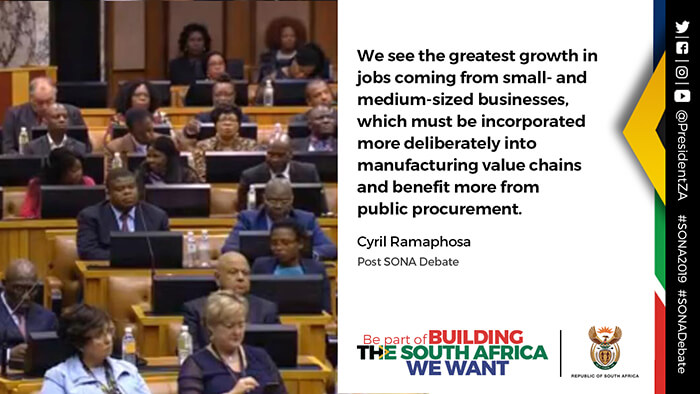
State-owned entities
We have done much to address governance challenges at several state owned enterprises and have been decisive in tackling corruption and state capture.
State owned companies have a critical role to play – in tandem with the private sector – in driving economic growth and transformation.
We disagree with the view that the most effective and efficient way to provide services to our people is through the private sector.
Land reform
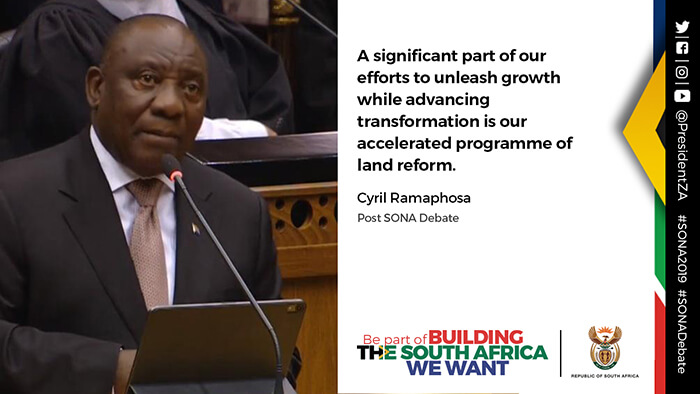
By bringing together the portfolios of agriculture, rural development and land reform, we are establishing the institutional basis for a comprehensive approach to the economic development of our rural areas.
Through this, we will unlock the potential of the sector by removing constraints in accessing land, finance, markets and water and improving safety in our rural areas.
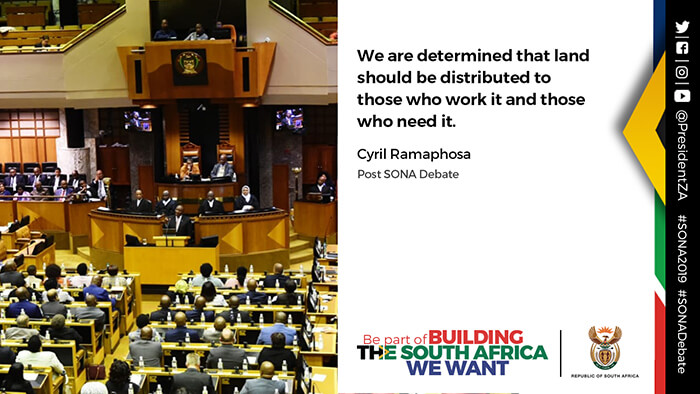
Expropriation is as an important land acquisition strategy. It is important because it enables us to conduct land reform in a pro-active and planned manner.
Our land reform agenda also includes recognising individual, family and community rights to land in accordance with lived experience.
We continue with the process of identifying suitable public land for human settlements and farming.
Infrastructure development
In the State of the Nation Address, we spoke about the establishment of the Infrastructure Fund and a new approach to building infrastructure.
This is where the partnership between the public and the private sector will ……. work together through joint funding arrangements as well as in the deployment of skills, management capability and experience.
In line with our new approach, unions and communities will be at the centre of our infrastructure build.
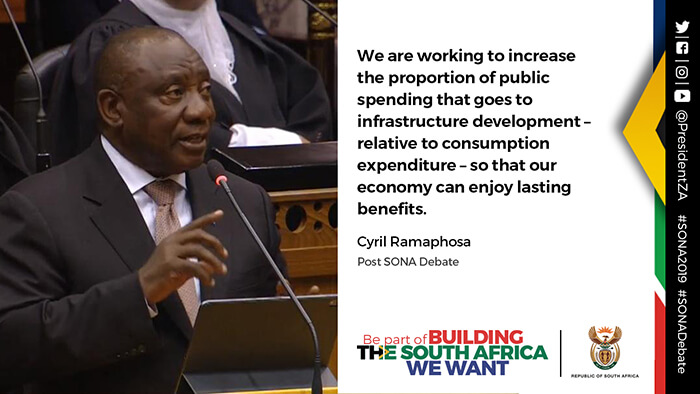
The upgrade and maintenance of the national road network is an important element of the economic stimulus package, contributing to job creation, access to local services and stimulating local economies.
Skills development
All these measures to grow the economy depend on our ability to develop skills that are appropriate to the needs of an economy that is changing.
We are investing in the expansion of our TVET colleges and ensuring that their programmes are aligned with the needs of industry and tomorrow’s world of work.
We are focusing greater attention on artisan development while expanding workplace-based learning through learnerships, work integrated learning and internships.
We have placed Higher Education alongside Science and Technology, so that we can harness our substantial scientific research capacity to develop graduates that have the advanced skills required to take our country into a new technological age.
It is why we are emphasising the teaching of science, technology, engineering and maths in schools, why we are introducing subjects like coding and data analytics.
Health
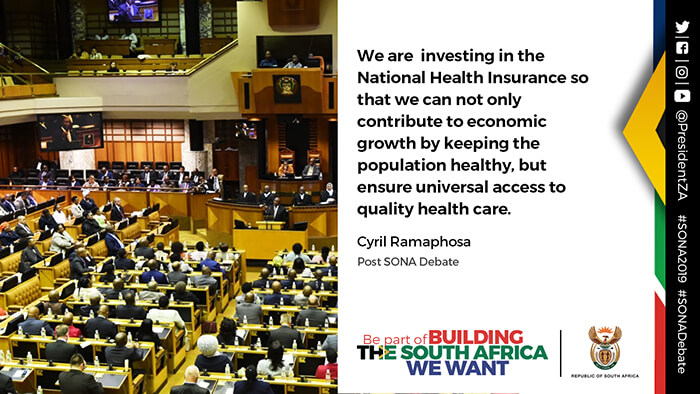
Safe and secure communities
It is the most fundamental right of our citizens to live in safety in their homes, in the streets, and in their communities.
This why one of our priority areas is social cohesion and safe communities.
Crime is devastating our communities and tearing our social fabric apart.
Young lives are being lost to the scourge of crime, gangsterism and substance abuse.
Part of our response is to increase police visibility, increase the number of trainee policemen and women, promote the sexual offences courts to address gender-based violence and femicide, and capacitate community policing forums.
At the same time, we must recognise that violent crime is often perpetrated by people who are known to the victim, in the home, in schools or in the community.
This makes policing difficult, but it must be done.
Local service delivery
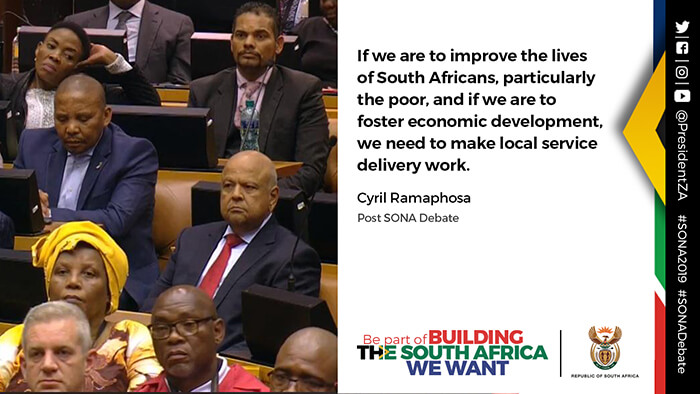
We need to fix our municipalities. One of our priorities is spatial integration, human settlements and local government.
This is because local government is the engine of service delivery.
In local government, as in all parts of the state, where systems fail, there must be accountability.
The country’s largest urban economies must play a far greater role in job-intensive growth and poverty reduction.
Ethical state
In line with our objective to restore not just investor confidence but regain the trust of our citizens, we have intensified the fight against corruption across government.
We have restored stability in important institutions like the South African Revenue Service and the National Prosecuting Authority and improved their capacity.
The Zondo commission of inquiry is doing crucial work in establishing the extent of state capture.
Integrity is being restored to our national intelligence machinery as we act on the recommendations of the High Level Review Panel on the State Security Agency.
Medium Term Budget Policy Statement
In the four months leading up to the Medium Term Budget Policy Statement in October, we will also work hard to meet some immediate policy milestones.
These include:
- an action plan on an effective visa regime for tourism and high skill immigration;
- a policy directive on the release of spectrum;
- an integrated and comprehensive youth employment strategy coordinated by a project management office in the Presidency;
- engagement with organised business on the Ease of Doing Business Roadmap;
- a national action plan to tackle extortion and violence at economic sites, especially in the construction sector;
- ensure the Economic Advisory Council, the Investment Advisory Council and the Presidential SOE Council to commence their work;
- launching the Township Entrepreneurship Fund;
- finalising the Integrated Resource Plan;
- publish a Special Paper on Eskom detailing a roadmap for the entity’s future;
- presenting progress on the Public-Private Growth Initiative and the country’s investment pipeline;
- the development of Industrial Strategy Masterplans in validated priority sectors;
- release our approach to land reform informed by the Advisory Panel’s report.
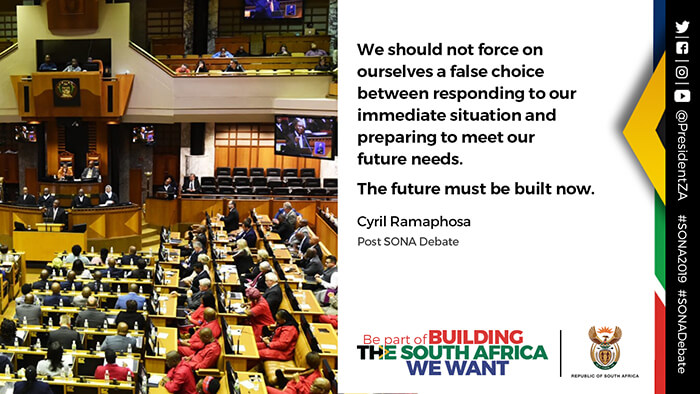
We will not succeed in either addressing the economic crisis of the present or building an inclusive future unless all South Africans play their part.
In the words of Kwame Nkrumah that Minister Patel quoted in the debate yesterday.
Nkrumah said:
“…the task ahead is great indeed, and heavy is the responsibility; and yet it is a noble and glorious challenge which calls for the courage to dream, the courage to believe, the courage to dare, the courage to do, the courage to envision, the courage to fight, the courage to work, the courage to achieve…”
We have a clear plan for the road ahead. We have a clear mandate. Now is the time for all of us to work together to implement it.
Let us always remember what Proverbs 29:18 instructs:
“Where there is no vision, the people perish.”
